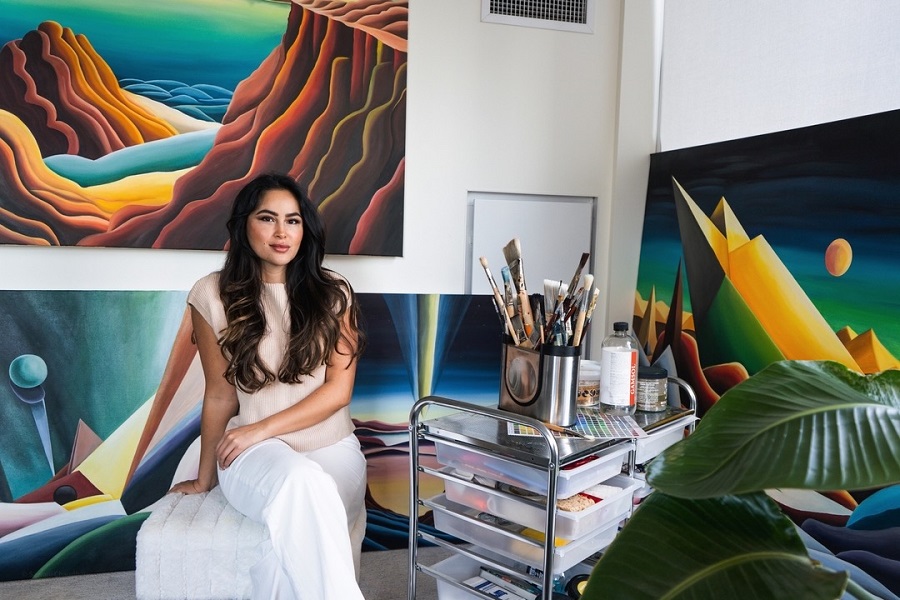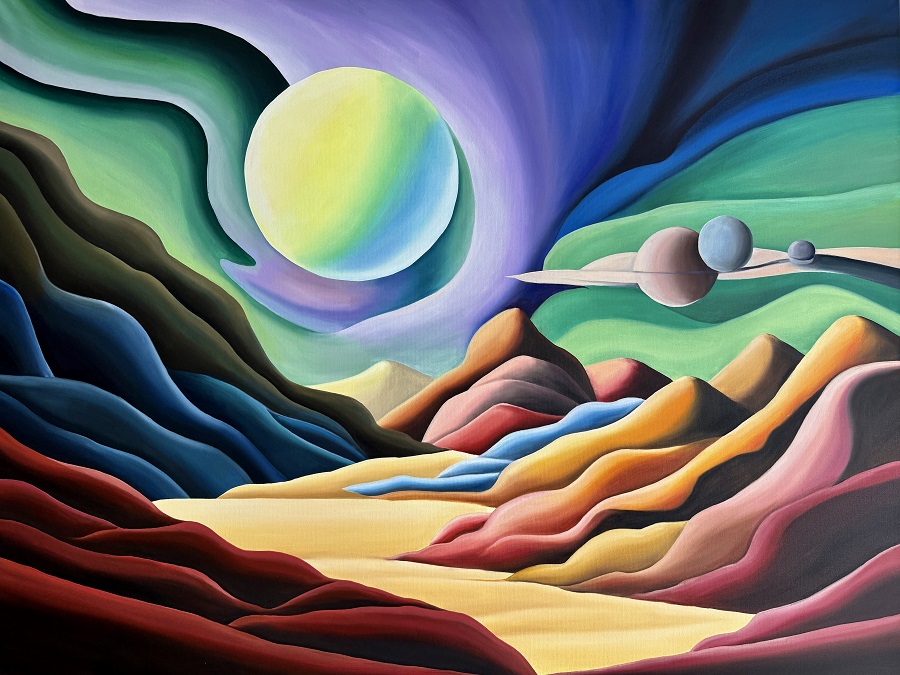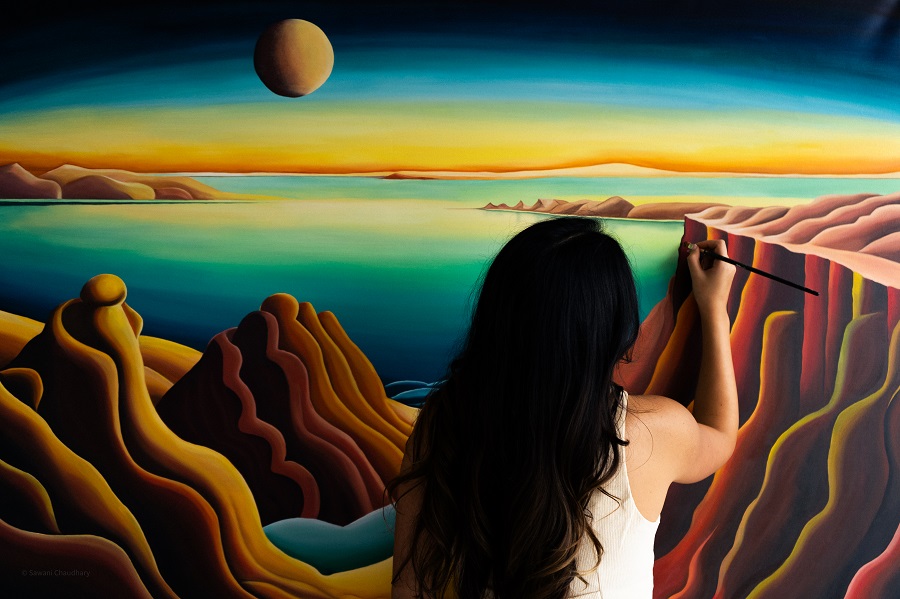DUBAI: Dalya Moumina is an emerging New York-based artist whose imaginative landscape paintings partially pay tribute to her Arab and Asian heritage. She was born in Washington DC in 1996 to a Saudi father and a Filipina mother. When Moumina was three years old, her family relocated to Saudi Arabia.
“Jeddah is always going to be home to me. Whenever I go back, it feels like I never left,” Moumina tells Arab News. “Growing up there was very adventurous. I lived the Jeddah lifestyle, right on the Red Sea, which was the best childhood to be honest. I’d go to the beach almost every weekend and we would do desert trips and hiking. I was also a professional horseback rider. I think the part of Jeddah that most influences me is definitely the water. The Red Sea is, in my opinion, the most beautiful sea out there. It’s so blue.”

Dalya Moumina in her studio. (Supplied)
She also has a special connection with the Philippines, which she visited every summer when growing up. “I’d see my mother’s side of the family and my cousins. The people are so kind-hearted. We would go to the islands there, like Boracay and Palawan. They’re absolutely stunning,” she says. “I think I try to bring those influences into my work, especially the tribal communities there. For example, in ceremonies, they’re very into face painting primitive shapes that symbolize different things.”
Those childhood memories have seeped into the bold utopian landscape imagery that Moumina started creating in 2019.
“We have volcanoes and beautiful islands in the Philippines. I think growing up around those extreme and contrasting landscapes led me to amalgamate them into my work, because the meandering, like, rivers and labyrinthine terrains there are unlike any other place, in my opinion — contrasting with the desert landscapes in Saudi Arabia,” she explains.

Dalya Moumina's 'Tempestuous Reverie.' (Supplied)
Although she doesn’t come from an artistic family, Moumina always found herself making collages, scrapbooking and drawing.
“I’ve been painting my whole life. I never took it seriously, but I think it was always an innate part of me,” she says. She also had an aunt who drew and she encouraged her niece. During high school, Moumina took art classes and actually sold her first artwork at a school exhibition.
She later attended the University of Virginia to study business, technology and psychology (along with a few art classes). It was while in Virginia that she discovered the work of American master Georgia O’Keeffe, who famously depicted America’s sweeping mountainous landscapes.
“She used to teach at my university, and she’s such a big inspiration in my work,” says Moumina. “I would say that our styles are similar, but, obviously, I’m trying to distinguish myself.”

The artist works on one of her paintings. (Supplied)
In 2019, Moumina graduated, but a few months later the COVID-19 pandemic hit. She started painting again during lockdowns.
“I really missed traveling, so I was thinking of the landscapes and the ocean from Saudi and the feeling of being by the beach,” she says. “I’ve always loved using oil paint, because it’s slow-drying and the colors are so rich. It’s very therapeutic and relaxing. Sometimes, I’ll play melodic music, other times I’ll work in silence. Whenever I start painting, I just go into a flow state of mind and work for hours — forgetting to eat. You don’t even realize it.”
Moumina’s arresting landscapes feel otherworldly, isolated and fantasy-like. At times, a large yellow sun dominates the composition, above wave-like mountains and flowing rivers. Inspired by cubism and surrealism, Moumina executes her paintings in three-dimensions, with sharp contrasts and bold colors.
“Each piece, I’d say, has a distinctive energy and character,” she says. “I don’t want people to just look at the work, I want them to feel something and walk away thinking about it more, and thinking something new. I try to lure people in through the energizing presence of fresh possibilities. . . I hope people see, through my work, that everything is simply interconnected and interactive.”

The artist's 'Harmony Rising.' (Suuplied
Along with the vivid colors and energy in Moumina’s work, there is also a sense of somberness. “There’s so much happening in the world,” she says. “I think of my grandmother, who was Palestinian. She was evicted from her home back in the Forties, and I made a painting that was inspired by her. Because I live all the way in New York, it’s kind of hard to keep in touch with what’s happening in the Middle East.”
Moumina has been living in New York — which she describes as “the art capital of the world” — for two years, and she is represented by GR Gallery. On May 3, a group show, “Transfiguration,” opened at the gallery. The show includes a selection of Moumina’s nature pieces. She says that being an artist in a well-established art scene like New York is competitive, and that she has considered doing a Master’s degree in art, but she realized that she needed something more in order to succeed.
“What helps you in this industry is networking and not staying in your studio 24/7,” says Moumina, who describes herself as sociable and extroverted. “Half of it is also connecting with other artists and really putting yourself out there.”
She also believes that being both Saudi and a woman has been an advantage so far in her career. “I think it’s still a male-dominated field,” she says. “But a lot of gallery owners are trying to bring up more female artists, because that’s what’s kind of in demand nowadays.”
























